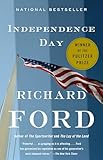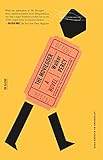Have you read Jernigan? It’s a novel by David Gates, published in 1992. It was a finalist for that year’s Pulitzer Prize, and it is a great book that, according to a very informal poll I recently conducted, no one has read, and most people haven’t heard of. The only reason I have: when I worked at EPOCH magazine, the journal’s long-time and much-beloved editor-in-chief, Michael Koch, stumped for Jernigan as something of an already lost classic. Over the course of the ensuing few years, I kept remembering, then forgetting, to read it. Finally, a few months ago, I recalled its existence when I had nothing else to read and bought it on Kindle. It’s a strange book to e-read. It’s one of those novels that really wants to be read as a physical book. As I scrolled along, I felt I should own a dog-eared and coffee-stained copy that I’d already reread once or twice before. It is familiar, mostly in good ways and a few bad.
It feels anachronistically familiar, I think, partly because it is a reminder of a kind of book that used to be written and published all the time about unhappy white guys. A host of factors—among them, an increased awareness of systemic sexism and racism and privilege facilitated by the internet and social media—more or less put an end to this kind of book, or at least forced it to shape-shift into, say, the techno-fascism of a Michel Houellebecq or the neo-Victorian realism of Jonathan Franzen. Jernigan is one of the last pure versions of this kind of book, but a better version that deserves rediscovery, one that in some thematic ways anticipates the end of its era.
From around 1950 to 2000, books about unhappy white guys were written frequently enough to constitute a subgenre of literary fiction: call it, let’s say, Unhappy White Guys. Or UWG. Of course, one might argue that UWG has been a genre since time immemorial, since before Hamlet stalked the parapet being mad at his stepfather. This is generally true, but I’m thinking here of a certain very specific type of unhappy white guy: post-war American, middle to upper-middle class, suburban, straight, and usually WASP. In other words, more or less, the most racially, sexually, and economically privileged people ever to walk the face of the earth, a class of human who faced no threat on any front, except from themselves.
For the purpose of this essay I would exclude books that don’t meet these full criteria. Hemingway’s novels, for instance, very much feature unhappy white guys, but they are mostly pre-WWII and shouldering the burden of war, what we would probably describe now as PTSD. Jake Barnes, for instance, is unhappy, white, and a guy, but his ambiguous war wound complicates what would otherwise be aimless ennui.
Leonard Michaels’s characters are often unhappy white guys, but they are largely Jewish and urban, with a sense of the world extending past the emerald rectangles of their front yards, and a sense of history that reaches back past the pictures on their fraternity walls. Likewise, Philip Roth, whose characters were also often less unhappy than horny, or unhappy because they were horny, at any rate featuring horniness as the dominant note. Updike’s white guys are not generally unhappy; as with Roth’s characters, they are also monomaniacally obsessed with their own phalluses, often to the exclusion of the outside world and any meaningful sense of angst about it. Speaking of angst: yes, Rabbit Angstrom is an unhappy white guy, but just barely, with his lower-class provenance, his salesman job, his grotty hometown in the Pennsylvania hills.

A facile timeline of UWG might be roughly drawn between the two Richards—Yates and Ford—and their two great protagonists, both named Frank. From Revolutionary Road to Independence Day, this genre tends to take up as its work the definition of a specific variety of late-20th-century spiritual malaise, the sense that, despite having it all (perhaps even because of it), life is still somehow lacking. It is a particular brand of pure, distilled dissatisfaction only possible if you have almost nothing else to truly worry about. Yet the unhappy white guys at the center of these stories, in one way or another, feel deceived. The American dream, as defined by a big house and two cars and wife and kids, has failed to deliver the happiness it promised, and so the protagonist casts around with increasing desperation trying to find the thing that is missing. Whatever else its failings and blind spots, this genre performs a valuable—if at times unintentional—autopsy on the idea of orthodox capitalist happiness. Per Don Draper, our foremost televised unhappy white guy: “What is happiness? It’s a moment before you need more happiness.”
Yates and Cheever were probably its foremost early post-war practitioners, although Cheever, at least in his short fiction, was weirder and more of a fabulist, interested in the suburbs as both a locus of stifling orthodoxy and as a liminal space of potential magic (something I discuss here). Yates’s Frank Wheeler is the archetype: successful, smart, handsome, and completely fucking miserable. Though his abusive marriage with April Wheeler is almost operatically unhappy, the true locus of his misery is the floating unease at not finding magical satisfaction on Revolutionary Road.



One can draw a straight line from Frank Wheeler to Frank Bascombe, the hero of Richard Ford’s trilogy The Sportswriter, Independence Day, and (the execrably titled) Let Me Be Frank With You. If Wheeler is the archetype, Independence Day’s Bascombe is more or less the type’s mature culmination, mellowed by the real and fictional decades separating Wheeler and himself. Bascombe, a gently restive real estate agent, cannot please anyone: his clients, his ex-wife, his new girlfriend, his struggling son, himself. The moments of respite in this (beautifully written, but to me, somewhat agonizingly dull book) are the quiet moments of zen-like joy in the little things that the Jersey suburbs can provide as well as anywhere else. Here, Ford borrows directly from Walker Percy’s The Moviegoer, whose Binx Bolling, an unhappy white guy par excellence, genially harasses a procession of secretaries into unsatisfying affairs, while “spinning” up and down Biscayne Bay in a little red sportscar on what he calls “The Search.” The Search is hazily defined, but generally refers to a receptiveness to the ineffable moments of grace and sublime beauty that, if they could be constantly existed in, would make someone like Binx—or Frank Bascombe, or Frank Wheeler—stop being so unhappy, if not so white.
To return to Jernigan—it would, on appearances, seem to offer more or less textbook UWG. Peter Jernigan is a failing real estate agent and drinker; a pensive wanderer who falls into bed with a neighborhood woman he doesn’t especially like; a narcissistic man-child whose teenage son is more grown up than he is. But Jernigan’s narration, at turns both theatrically self-dramatizing and self-aware of his self-dramatization (the title itself winks at his habit of third-person self-reference), offers something beyond the customary portrait of suburban malaise.
The novel is, among other things, an anatomy of the alcoholic mind. Since losing his unstable wife a year earlier to a freak car accident (crucially, Jernigan begins with the spousal tragedy that ends Revolutionary Road), our hero has descended into a shadowland that finds him waking on his couch at odd hours, having nodded off while watching a baseball game or Star Trek reruns. But Gates smartly plays the alcoholic notes lightly, and the reader’s main attention is absorbed by Jernigan’s lacerating solipsism. His narration recalls the best unhappy white guys before him, while simultaneously acknowledging and undercutting the usual sense of stakesless ennui. Like Binx Bolling and Frank Bascombe, Peter Jernigan’s lassitude leads him into trouble and accounts for much of the novel’s plot, though Jernigan’s lassitude is not born so much of complacent spiritual unrest as it is of depression and subtly rendered near-constant intoxication. That it often reads like a standard-variety suburban comedy of errors is a testament to Gates’s supreme control of his subject and his subject’s illness. Jernigan views himself in a gently ironic light, a received self-image handed down from the likes of Frank Bascombe—that is, as a man of his time and place, committed to committing his mistakes, mostly harmless. Like many alcoholics (and the reader), Jernigan only becomes aware of the true immensity and horror of his situation when it’s too late; that is, when he’s practically frozen to death in an abandoned shack with alcoholic tremors.

Gates’s rendering of Jernigan’s alcoholic spiral feels spookily real. Not so much the outright delusions or denials, or the false moments of control—markers we’ve come to expect from addiction memoirs—as the steadily accretive fact of it in the background. A tossed-off mention of a beer with breakfast, a soda topped jauntily with a little gin to make the drive to New York more fun, and before we know it, Jernigan is once again waking in the half-light, trying to remember where he is. Although he is a self-dramatizing narrator (the form of the book is, as we find out later on, a kind of bravura confessional from the confines of a rehab facility) the rendering of drinking is the opposite of Fred Exley’s in A Fan’s Notes, one of Jernigan’s other UWG spiritual forebears. Exley is all wildness and braggadocio, the college kid who lines up liquor bottles on his dorm window; Jernigan’s drinking is the stealthy veteran drinking of middle age, an accounting that fudges the numbers as the tally climbs upward.
The overall effect is a book and narrator both firmly in the
UWG lineage, and also outside of it, in some ways commenting on it. The louche
sexual politics are of a piece with the genre, as is the anodyne feel of
Jernigan’s Reaganite Jersey suburbia. But despite the insularity of the locale,
and in contradistinction with the unhappy white guys before him, Jernigan faces
very real problems, and not just from himself. For instance, from the .22 rifle
in the basement that his girlfriend uses to kill farmed rabbits for supper; for
instance, from the ex-husband who shows up unannounced and in terrifying
fashion; for instance, from the son’s unstable, drug-taking girlfriend.
The tradition of UWG novels typically finds its Angstrom or Bascombe or Bolling or Wheeler at war with themselves, their own worst enemy. From the vantage of 2019, this seems beyond quaint, positively antique. While Jernigan, too, features this mode of contemplative self-destruction, there is also a prescient feeling of the world beginning to creep in at the edges, a sense of the white guy’s imminent fall from his placid, unhappy Eden.
The post Jernigan: The Last Unhappy White Guy appeared first on The Millions.
Source : Jernigan: The Last Unhappy White Guy















